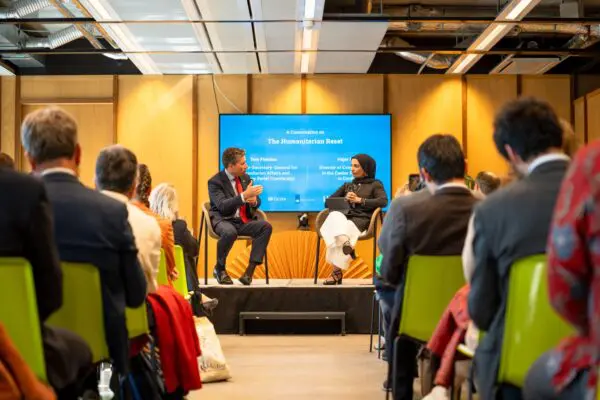On May 28, The Hague Humanity Hub welcomed UN Relief Chief Tom Fletcher and Hajer Naili from the Center for Civilians in Conflict for an urgent conversation on the future of humanitarian action. Organized by OCHA in partnership with the Dutch Ministry of Foreign Affairs and The Hague Humanity Hub, the event brought together an in-person and online audience at a critical moment for the humanitarian community.
At a time of growing needs and shrinking resources, the humanitarian system is being asked not only to do more with less—but to think differently, act boldly, and reset the foundations of its own work.
What is the Humanitarian Reset?
In Fletcher’s words, the “Humanitarian Reset” is more than just a reform plan—it is a rallying cry to regroup, reform, and renew. It acknowledges that the current humanitarian model is unsustainable, overstretched, and increasingly undermined by funding cuts, impunity, and political complexity. The aim is not just to adapt but to fundamentally realign around saving lives, empowering local actors, and restoring the legitimacy of humanitarian principles in a world that is becoming, as Fletcher described, “more transactional, more inward-looking, and more nationalist.”
This isn’t the first time reform has been attempted. But what makes this moment different, Fletcher argued, is the combination of urgency, leadership, and a rare alignment of will. “Even before the cuts, we were already underfunded, overstretched, and literally under attack,” he noted. “We’ve got to regroup—not just as a sector, but as a movement.”
The Painful Reality of Hyper-Prioritization
One of the most controversial aspects of the reset is OCHA’s hyper-prioritization plan. As resources dwindle, the United Nations is preparing to scale down from assisting over 300 million people globally to around 100 million. As Naili puts it, it means saying to roughly 200 million people: “we see you, but we can’t help you”.
It is a brutal calculus, and one that cannot be softened by bureaucratic language. “We have to show donors and the people we serve that we are willing to make the hard choices to save lives,” Fletcher said.
But these decisions come with moral and strategic risks. As moderator Hajer Naili reflected in an article published after the event, “If some people are to be deprioritized, then we owe them transparency, empathy, and engagement.” Needs do not disappear just because aid is withdrawn—they simply recede from view.
Resetting the Mindset, Not Just the System
At its heart, the reset is as much about changing how the humanitarian system thinks as how it operates. Naili emphasized that without a shift in mindset—toward more humility, inclusion, and trust in local actors—any reset risks becoming just a reshuffle. True reform, she argued, begins with power: who holds it, who shares it, and who is heard.
That critique echoed in the room, especially around whether the reset has thus far been too UN-centric. Fletcher acknowledged the concern and emphasized the importance of to a “redistribution of power” within the system—one that would center local communities not just as recipients of aid, but as agents of humanitarian response.
Gaza, Principles, and the Perils of Compromise
The conversation took on added urgency in light of events in Gaza. Fletcher, who recently told the UN Security Council to act “decisively to prevent genocide,” spoke bluntly about the humanitarian collapse and the dangers of dehumanizing, militarized aid mechanisms. “If you accept compromise in Gaza, then tomorrow you’ll be compromising in Ukraine, Darfur, Haiti,” he warned.
For both speakers, upholding humanitarian principles—neutrality, independence, humanity—is not a luxury. It is the only way to ensure credibility, safety, and access. “Neutrality does not mean silence,” Naili later wrote. “Quiet diplomacy has its place. But fear of losing access cannot erode the values that define us.”
Looking Ahead: Strategic Courage in a Fragmented World
Throughout the event, a key theme emerged: now is a moment that demands strategic courage. As one participant reflected after the session, we are “at the intersection of urgency, opportunity, and will.” Reform requires not just redesign, but consistency and difficult conversations.
It also requires storytelling. As Naili put it, “The stories we tell—or don’t tell—are shaping public perception, political will, and ultimately, funding.” If the humanitarian sector doesn’t communicate its values, others will do it instead—and not always truthfully.
A Home for the Reset
We were proud to host this conversation at The Hague Humanity Hub, a platform that brings together changemakers working for a more peaceful and just world. Moments like this—where leaders engage directly with practitioners, communicators, students, and citizens—are vital for breaking down silos and sparking the kind of thinking that makes real change possible.
As Fletcher said, “We’ve got to hold that space for hope and idealism and not give up on what we do.”
We invite you to watch the full recording of the event here and join the conversation about what it means to reset humanitarian action in today’s world. Reach out to engage@humanityhub.net if you have collaboration opportunities or suggestions on how to approach this topic.
